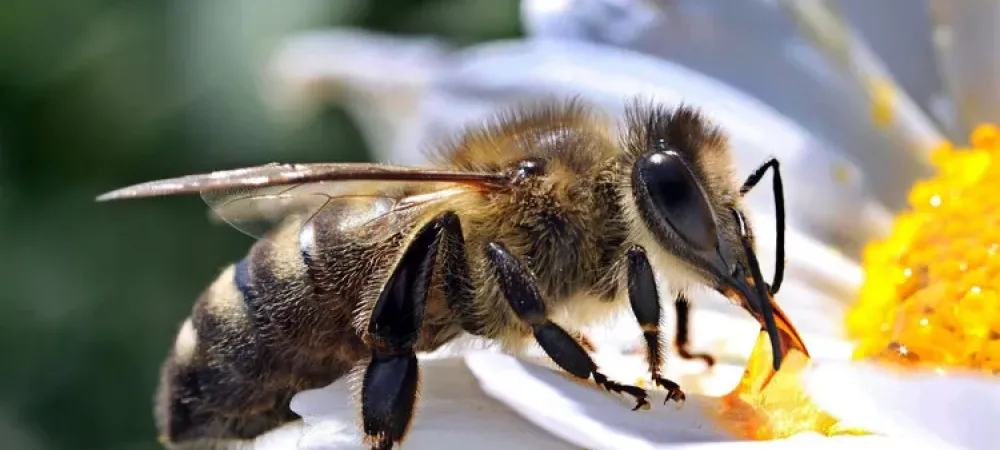How to Get Rid of African Bees

Bees play an important role in the reproduction of flowering plants and keeping insects at bay, and pose no threat to humans most of the time. However, some bee species, “Africanized” honey bees or “Killer” bees, can become aggressive when agitated. The venom of their stings can be deadly. If you find yourself with a bee infestation, take the proper precautions to deal with the problem right away before someone gets hurt.
Determine If The Bees Need to Be Removed
Africanized honey bees are slightly smaller than their European counterparts. They can be distinguished by their golden-brown color, a thin coating of fur on their bodies, and bulbous, striped tail sections. Despite the uniformity of their appearance, an expert eye is usually required to tell the difference between a normal honey bee and a dangerous killer bee.
Call Your Local Bee Removal Service or Pest Control Company
Local pest control companies and/or bee removal services can be found online or in a phone book, or you can contact your local Fire Department, and they will be able to refer you to bee removal services in your area, including your city's animal control department.
- Professional bee removal services may be costly, but they are the safest way to get rid of an infestation.
- Not all commercial pest control services may be equipped to deal with killer bee infestations. Call the company and ask if this is within their capability.
Eliminating Bees Naturally or With Pesticide Sprays (DIY)
Make sure you’re completely covered if you decide to tackle your bee problem on your own. You will need to cover all exposed parts of your body to protect yourself from stings. Layer thick, long-sleeved clothing with work boots, gloves, and eye and face protection to minimize your risk of being stung. Getting stung multiple times can be fatal, so don’t put yourself at unnecessary risk.
- Killer bee venom is no stronger than that of common varieties of honey bees, but they tend to swarm in overwhelming numbers and are much more easily provoked.
- Avoid wearing strong fragrances or causing a commotion when preparing to raid a killer bee nest. Unusual stimuli may draw their attention and incite them to swarm.
Prevent Future Infestations
Remove the comb. If you’ve managed to locate the nest, you’re going to want to remove and destroy the comb. Most Africanized honey bees make their nests in ordinary enclosed spaces but construct fibrous networks inside, known as "combs," where they live, reproduce, and manufacture honey. Once most of the bees around the nest have been dealt with, the comb itself can be thrown away, crushed, or burnt. A pressure washer can be used to take down a hanging beehive from a safe distance or hard-to-reach crevices.
Call An Expert to Remove The Comb
Even if you can’t afford to retain the services of a professional bee remover, or if the bees pose an immediate threat and time is of the essence, you might still be able to have the nest comb removed without cost after you’ve dealt with the worst of the infestation. Keep an eye out for where bees are coming from and returning to. By tracking their movements, you can often locate their nest.
- When handling a hive or comb, watch out for any bees that might remain inside.
- Thoroughly rinse the area where the nest was found with a garden hose after it’s been disposed of to eliminate scents that might attract other bees.
Pick up any stray buckets, boxes, or other containers lying around your property that bees might build a nest in. Most bees prefer to live in cool, dark spaces, so pay particular attention to your garage, basement, work shed, garbage bins, and any covered areas around your home. Fill large gaps in brick or concrete walls to keep bees from nesting there.
Fenn Termite & Pest Control, Inc. is you source for pest control in LA and the surrounding SOCAL cities. Our technicians are trained to help manage Africanized honey bees and similar pests. Since every building or home is different, your professional Pest Control technician will design a unique program for your situation.